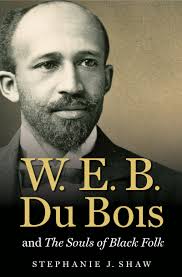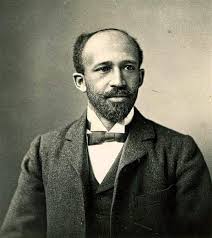The Souls of Black Folk Page #20
The Souls of Black Folk is a 1903 work of American literature by W. E. B. Du Bois. It is a seminal work in the history of sociology and a cornerstone of African-American literature. The book contains several essays on race, some of which the magazine Atlantic Monthly had previously published.
VI. Of the Training of Black Men Why, if the Soul can fling the Dust aside, And naked on the Air of Heaven ride, Were’t not a Shame—were’t not a Shame for him In this clay carcase crippled to abide? OMAR KHAYYÁM (FITZGERALD). From the shimmering swirl of waters where many, many thoughts ago the slave-ship first saw the square tower of Jamestown, have flowed down to our day three streams of thinking: one swollen from the larger world here and overseas, saying, the multiplying of human wants in culture-lands calls for the world-wide cooperation of men in satisfying them. Hence arises a new human unity, pulling the ends of earth nearer, and all men, black, yellow, and white. The larger humanity strives to feel in this contact of living Nations and sleeping hordes a thrill of new life in the world, crying, “If the contact of Life and Sleep be Death, shame on such Life.” To be sure, behind this thought lurks the afterthought of force and dominion,—the making of brown men to delve when the temptation of beads and red calico cloys. The second thought streaming from the death-ship and the curving river is the thought of the older South,—the sincere and passionate belief that somewhere between men and cattle, God created a tertium quid, and called it a Negro,—a clownish, simple creature, at times even lovable within its limitations, but straitly foreordained to walk within the Veil. To be sure, behind the thought lurks the afterthought,—some of them with favoring chance might become men, but in sheer self-defence we dare not let them, and we build about them walls so high, and hang between them and the light a veil so thick, that they shall not even think of breaking through. And last of all there trickles down that third and darker thought,—the thought of the things themselves, the confused, half-conscious mutter of men who are black and whitened, crying “Liberty, Freedom, Opportunity—vouchsafe to us, O boastful World, the chance of living men!” To be sure, behind the thought lurks the afterthought,—suppose, after all, the World is right and we are less than men? Suppose this mad impulse within is all wrong, some mock mirage from the untrue? So here we stand among thoughts of human unity, even through conquest and slavery; the inferiority of black men, even if forced by fraud; a shriek in the night for the freedom of men who themselves are not yet sure of their right to demand it. This is the tangle of thought and afterthought wherein we are called to solve the problem of training men for life. Behind all its curiousness, so attractive alike to sage and dilettante, lie its dim dangers, throwing across us shadows at once grotesque and awful. Plain it is to us that what the world seeks through desert and wild we have within our threshold,—a stalwart laboring force, suited to the semi-tropics; if, deaf to the voice of the Zeitgeist, we refuse to use and develop these men, we risk poverty and loss. If, on the other hand, seized by the brutal afterthought, we debauch the race thus caught in our talons, selfishly sucking their blood and brains in the future as in the past, what shall save us from national decadence? Only that saner selfishness, which Education teaches, can find the rights of all in the whirl of work. Again, we may decry the color-prejudice of the South, yet it remains a heavy fact. Such curious kinks of the human mind exist and must be reckoned with soberly. They cannot be laughed away, nor always successfully stormed at, nor easily abolished by act of legislature. And yet they must not be encouraged by being let alone. They must be recognized as facts, but unpleasant facts; things that stand in the way of civilization and religion and common decency. They can be met in but one way,—by the breadth and broadening of human reason, by catholicity of taste and culture. And so, too, the native ambition and aspiration of men, even though they be black, backward, and ungraceful, must not lightly be dealt with. To stimulate wildly weak and untrained minds is to play with mighty fires; to flout their striving idly is to welcome a harvest of brutish crime and shameless lethargy in our very laps. The guiding of thought and the deft coordination of deed is at once the path of honor and humanity. And so, in this great question of reconciling three vast and partially contradictory streams of thought, the one panacea of Education leaps to the lips of all:—such human training as will best use the labor of all men without enslaving or brutalizing; such training as will give us poise to encourage the prejudices that bulwark society, and to stamp out those that in sheer barbarity deafen us to the wail of prisoned souls within the Veil, and the mounting fury of shackled men. But when we have vaguely said that Education will set this tangle straight, what have we uttered but a truism? Training for life teaches living; but what training for the profitable living together of black men and white? A hundred and fifty years ago our task would have seemed easier. Then Dr. Johnson blandly assured us that education was needful solely for the embellishments of life, and was useless for ordinary vermin. To-day we have climbed to heights where we would open at least the outer courts of knowledge to all, display its treasures to many, and select the few to whom its mystery of Truth is revealed, not wholly by birth or the accidents of the stock market, but at least in part according to deftness and aim, talent and character. This programme, however, we are sorely puzzled in carrying out through that part of the land where the blight of slavery fell hardest, and where we are dealing with two backward peoples. To make here in human education that ever necessary combination of the permanent and the contingent—of the ideal and the practical in workable equilibrium—has been there, as it ever must be in every age and place, a matter of infinite experiment and frequent mistakes. In rough approximation we may point out four varying decades of work in Southern education since the Civil War. From the close of the war until 1876, was the period of uncertain groping and temporary relief. There were army schools, mission schools, and schools of the Freedmen’s Bureau in chaotic disarrangement seeking system and co-operation. Then followed ten years of constructive definite effort toward the building of complete school systems in the South. Normal schools and colleges were founded for the freedmen, and teachers trained there to man the public schools. There was the inevitable tendency of war to underestimate the prejudices of the master and the ignorance of the slave, and all seemed clear sailing out of the wreckage of the storm. Meantime, starting in this decade yet especially developing from 1885 to 1895, began the industrial revolution of the South. The land saw glimpses of a new destiny and the stirring of new ideals. The educational system striving to complete itself saw new obstacles and a field of work ever broader and deeper. The Negro colleges, hurriedly founded, were inadequately equipped, illogically distributed, and of varying efficiency and grade; the normal and high schools were doing little more than common-school work, and the common schools were training but a third of the children who ought to be in them, and training these too often poorly. At the same time the white South, by reason of its sudden conversion from the slavery ideal, by so much the more became set and strengthened in its racial prejudice, and crystallized it into harsh law and harsher custom; while the marvellous pushing forward of the poor white daily threatened to take even bread and butter from the mouths of the heavily handicapped sons of the freedmen. In the midst, then, of the larger problem of Negro education sprang up the more practical question of work, the inevitable economic quandary that faces a people in the transition from slavery to freedom, and especially those who make that change amid hate and prejudice, lawlessness and ruthless competition.
Translation
Translate and read this book in other languages:
Select another language:
- - Select -
- 简体中文 (Chinese - Simplified)
- 繁體中文 (Chinese - Traditional)
- Español (Spanish)
- Esperanto (Esperanto)
- 日本語 (Japanese)
- Português (Portuguese)
- Deutsch (German)
- العربية (Arabic)
- Français (French)
- Русский (Russian)
- ಕನ್ನಡ (Kannada)
- 한국어 (Korean)
- עברית (Hebrew)
- Gaeilge (Irish)
- Українська (Ukrainian)
- اردو (Urdu)
- Magyar (Hungarian)
- मानक हिन्दी (Hindi)
- Indonesia (Indonesian)
- Italiano (Italian)
- தமிழ் (Tamil)
- Türkçe (Turkish)
- తెలుగు (Telugu)
- ภาษาไทย (Thai)
- Tiếng Việt (Vietnamese)
- Čeština (Czech)
- Polski (Polish)
- Bahasa Indonesia (Indonesian)
- Românește (Romanian)
- Nederlands (Dutch)
- Ελληνικά (Greek)
- Latinum (Latin)
- Svenska (Swedish)
- Dansk (Danish)
- Suomi (Finnish)
- فارسی (Persian)
- ייִדיש (Yiddish)
- հայերեն (Armenian)
- Norsk (Norwegian)
- English (English)
Citation
Use the citation below to add this book to your bibliography:
Style:MLAChicagoAPA
"The Souls of Black Folk Books." Literature.com. STANDS4 LLC, 2024. Web. 29 Dec. 2024. <https://www.literature.com/book/the_souls_of_black_folk_310>.




Discuss this The Souls of Black Folk book with the community:
Report Comment
We're doing our best to make sure our content is useful, accurate and safe.
If by any chance you spot an inappropriate comment while navigating through our website please use this form to let us know, and we'll take care of it shortly.
Attachment
You need to be logged in to favorite.
Log In